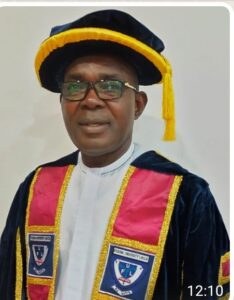


The celebrant,Dr. Salisu Ogbo Usman. Rector,Kogi state Polytechnic, Lokoja.
By Dada Ahmed in Lokoja.
The Deputy Vice Chancellor (Academic), Federal University,FUL,Lokoja,kogi state,Prof.M .S Audu said for the Academic Staff Union of Universities, ASUU, to be a thing of the past, there is need for ASUU to change the tactics it has been using for over 40 years without much tangible result.

The Guest Speaker,Prof.M.S Audu.
He stated this on Wednesday in Lokoja as the Guest Speaker in his paper, entitled,”FEDERAL GOVERNMENT OF NIGERIA (FGN)-ACADEMIC STAFF UNION OF UNIVERSITIES (ASUU) IMBROGLIO: INTERROGATING THE ISSUES AND THE WAY FORWARD”,at the 50th birthday and Lecture & Public Presentation of Two Books in honour of the Rector,Kogi state Polytechnic, Lokoja.
The Reporters recalls that ASUU members in public universities in the country went on an 8 month strike on February 14 to press home their demand on the federal government to honour the agreement it reached with them in 2009 over the funding of such a citadel of education and sundry issues bordering on their welfare.
Though ASUU members could not achieve all their aims in the strike, early October,they suspended it, citing intervention of stakeholders,such as President Muhammadu Buhari and the Speaker, House of Representatives, Femi Gbajabiamila among others.
According to him, ASUU should inject some dynamism and new ideas in her approaches to issues of the state of the universities and their welfare.
” For the past 45 years, ASUU has adopted the same strategy of agitation for welfare of its members and the state of the universities and the nation.
“In the last 23 years, ASUU has embarked on strike action 16 times. It can be safely said that since the return to democracy in 1999, public universities have been shut down for four years. It takes a normal Bachelor degree programme four years to complete.
The guest speaker also advised the federal government to always honour agreement with ASUU, noting that the last strike by the union came up because the federal government failed to honour the agreement it signed with the union in 2009, on how to improve funding of public universities in the country.
Going memory lane,Prof.Audu recalled that “the government entered into an understanding with the union to ameliorate the situation in 2009.
“It sets up the NEEDS Assessment Committee that came up with the report that federal government would require the sum of 1.3 Trillion Naira to fix the public universities as documented in the 2013 Memorandum of Understanding.
“The 1.3 trillion naira was to be released in annual tranches of N200 billion in 2013 and N220 billion each year for the period 2014 to 2018.
“The government only showed commitment to the MoU by releasing only N200 billion in 2014, N20 billion in 2019 and N30 billion in 2021. This development shows that the government has repudiated the MoU of 2013.
Governor Yahaya Bello, represented by his Chief of Staff, Pharm Abdulkareem Asuku, described Dr. Usman as an “excellent leader” given his antecedent as a product of a humble beginning who by dint of hardwork and deligence, had sanitised and improved infrastructural development of the Polytechnic to the expectation of the state government and the people.
He, therefore,called on the students of the institution to consolidate on the achievements of his administration in educational development of the state, coupled with that of the Rector by shunning cultism, examination malpractice and others social vices that jeopardise their educational ambition.
The celebrant, who received standing ovation from the crowd,thanked his mother whom he said sold some of her property to enable him receive as well as the cross section of the society that turned up to honour him on his birthday.
He attributed his achievements in the Polytechnic to prudent management of the availability resources at his disposal,for greater achievements.
Our Correspondent reports that highlights of the occasion include presentation of two books,good will messages and cutting of cake.
Members of the traditional institution, politicians, academics, students, top governnent functionaries and business community among others.

